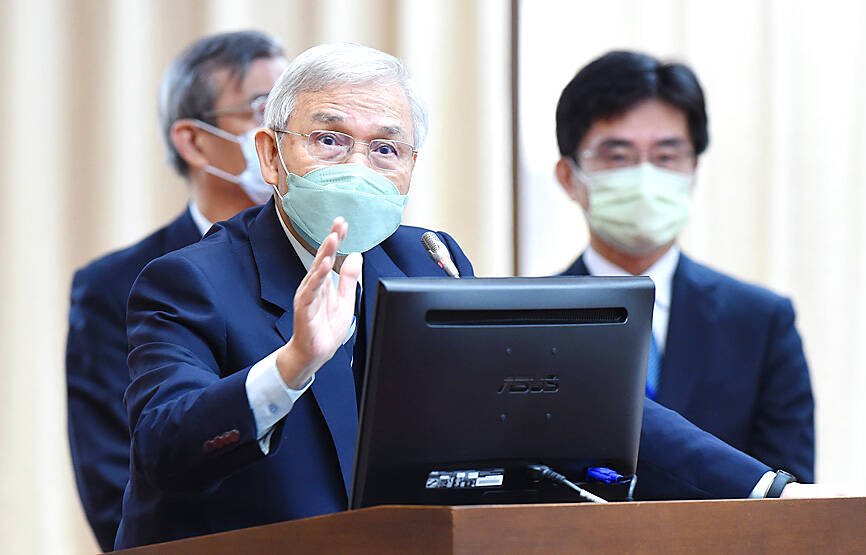The central bank yesterday introduced a series of regulatory measures that respond to the predicted effects of climate change on the nation’s economy and financial system, as Taiwan seeks to achieve net zero carbon emissions by 2050.
The top monetary policymaker said it has mapped out a framework for advancing two main policy goals — bolstering Taiwan’s economic and financial resilience with regard to climate change risks, and supporting a smooth transition to a sustainable green economy.
The central bank said it is cooperating with the Financial Supervisory Commission to help create a favorable environment for green and sustainable investment, bolster its understanding of climate risks, and factor those risks into daily operations and foreign exchange reserve management.

Photo: Liao Chen-hui, Taipei Times
Specifically, the bank said it would factor in climate change risks when projecting national GDP growth and establish models for each economic sector to gain a better understanding of the risks involved.
Further, the central bank plans to include sustainable financial performance into its open market operations, and use the measure on small-amount repurchase operations as a reference when processing deposit renewals and transfers.
The central bank said it would also conduct research on climate change risks as part of a macro-prudential tool, and invite experts and academics to conduct a stress test of financial institutions based on climate change risks.
Additionally, the bank said it would consider purchasing green bonds when managing foreign exchange reserves, and promote participation in international discussions and activities regarding climate change issues.
The bank has taken part in discussions and online meetings with Southeast Asian central banks and the Network of Central Banks and Supervisors for Greening the Financial System, it said.

TAKING STOCK: A Taiwanese cookware firm in Vietnam urged customers to assess inventory or place orders early so shipments can reach the US while tariffs are paused Taiwanese businesses in Vietnam are exploring alternatives after the White House imposed a 46 percent import duty on Vietnamese goods, following US President Donald Trump’s announcement of “reciprocal” tariffs on the US’ trading partners. Lo Shih-liang (羅世良), chairman of Brico Industry Co (裕茂工業), a Taiwanese company that manufactures cast iron cookware and stove components in Vietnam, said that more than 40 percent of his business was tied to the US market, describing the constant US policy shifts as an emotional roller coaster. “I work during the day and stay up all night watching the news. I’ve been following US news until 3am

Six years ago, LVMH’s billionaire CEO Bernard Arnault and US President Donald Trump cut the blue ribbon on a factory in rural Texas that would make designer handbags for Louis Vuitton, one of the world’s best-known luxury brands. However, since the high-profile opening, the factory has faced a host of problems limiting production, 11 former Louis Vuitton employees said. The site has consistently ranked among the worst-performing for Louis Vuitton globally, “significantly” underperforming other facilities, said three former Louis Vuitton workers and a senior industry source, who cited internal rankings shared with staff. The plant’s problems — which have not

UNCERTAINTY: Innolux activated a stringent supply chain management mechanism, as it did during the COVID-19 pandemic, to ensure optimal inventory levels for customers Flat-panel display makers AUO Corp (友達) and Innolux Corp (群創) yesterday said that about 12 to 20 percent of their display business is at risk of potential US tariffs and that they would relocate production or shipment destinations to mitigate the levies’ effects. US tariffs would have a direct impact of US$200 million on AUO’s revenue, company chairman Paul Peng (彭雙浪) told reporters on the sidelines of the Touch Taiwan trade show in Taipei yesterday. That would make up about 12 percent of the company’s overall revenue. To cope with the tariff uncertainty, AUO plans to allocate its production to manufacturing facilities in

TARIFF CONCERNS: The chipmaker cited global uncertainty from US tariffs and a weakening economic outlook, but said its Singapore expansion remains on track Vanguard International Semiconductor Corp (世界先進), a foundry service provider specializing in producing power management and display driver chips, yesterday withdrew its full-year revenue projection of moderate growth for this year, as escalating US tariff tensions raised uncertainty and concern about a potential economic recession. The Hsinchu-based chipmaker in February said revenues this year would grow mildly from last year based on improving supply chain inventory levels and market demand. At the time, it also anticipated gradual quarter revenue growth. However, the US’ sweeping tariff policy has upended the industry’s supply chains and weakened economic prospects for the world economy, it said. “Now